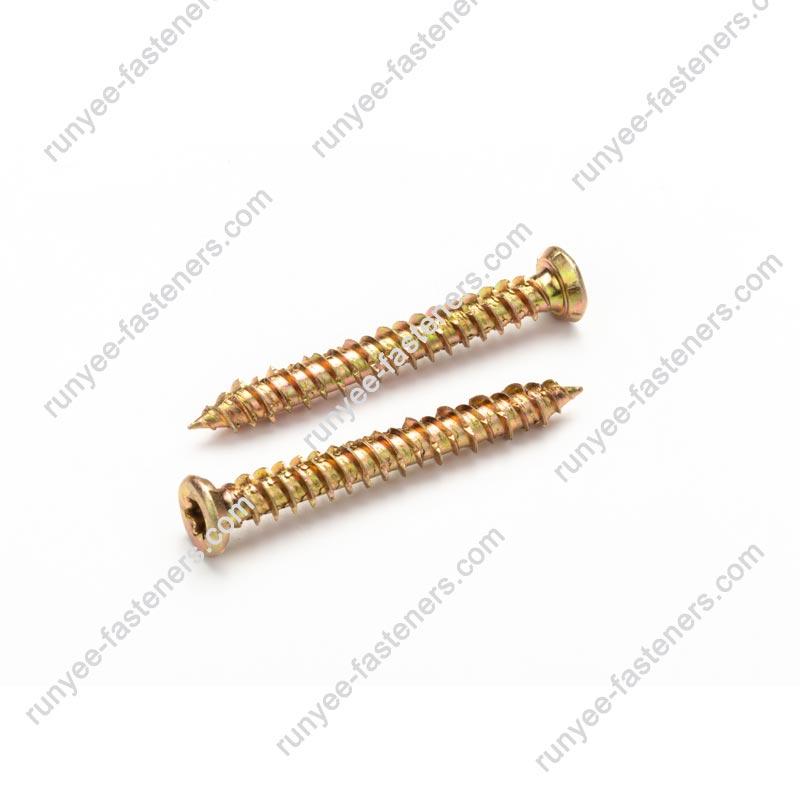How Do Concrete Screws Provide Strong and Reliable Fixing Solutions?
2025-09-30
Concrete screws have become one of the most reliable fastening solutions in modern construction. Unlike traditional anchors or expansion bolts, concrete screws provide a direct, secure connection to masonry, brick, and concrete surfaces without requiring complicated installation procedures. They are commonly used in both residential and industrial applications, ranging from attaching frames, shelves, machinery, and heavy fixtures to supporting safety-critical structures.
A concrete screw works by tapping its own threads into a pre-drilled hole in the concrete or masonry surface. This self-tapping ability ensures a tight fit that resists pull-out forces and vibrations. Construction professionals prefer them because they reduce installation time, avoid unnecessary damage to the substrate, and allow for easy removal or repositioning if needed.
Key Benefits of Concrete Screws:
-
High holding strength – Designed to grip firmly into dense materials.
-
Easy installation – Requires only a standard drill and screwdriver.
-
No additional anchor needed – Direct fastening saves time and cost.
-
Reusability – Can be removed and reinstalled without losing performance.
-
Corrosion resistance – Available with protective coatings for long-lasting use.
-
Versatile application – Suitable for concrete, brick, block, and stone.
The popularity of concrete screws continues to grow in regions where speed, efficiency, and safety are prioritized in construction projects. Builders, engineers, and even DIY users increasingly choose them as their go-to fastening solution.
How Do Concrete Screws Work and What Are Their Technical Parameters?
The working principle of a concrete screw is based on thread design and material hardness. Once a pilot hole is drilled into the concrete surface, the screw is driven into place. Its hardened threads cut into the material, creating a secure mechanical interlock. This design eliminates the need for expansion, which reduces stress on the substrate and minimizes the risk of cracking.
Technical Parameters of Concrete Screws
To help professionals and buyers make informed decisions, the following table presents the common parameters of concrete screws:
| Parameter | Specification Range |
|---|---|
| Diameter Options | 5.0mm, 6.3mm, 7.5mm, 10mm, 12mm |
| Length Options | 35mm to 200mm |
| Head Types | Hex Head, Flat Countersunk Head, Pan Head, Torx Head |
| Thread Type | High-Low Thread, Serrated Thread, Self-Tapping |
| Material | Carbon Steel, Stainless Steel |
| Surface Finish | Zinc Plated, Galvanized, Ruspert Coated, Epoxy Coated |
| Pull-Out Strength | Up to 15kN depending on diameter and substrate condition |
| Shear Strength | Up to 12kN depending on size |
| Drill Hole Requirement | Diameter typically 1-2mm larger than screw core |
| Applications | Masonry fixing, concrete anchoring, steel-to-concrete fixing |
Why Technical Precision Matters
Choosing the right diameter and length is crucial for ensuring safety and load-bearing capacity. For example, a 6.3mm x 50mm screw is commonly used for lighter fixtures like conduit clamps, while a 10mm x 150mm screw is better suited for structural connections. Coatings such as Ruspert or epoxy improve corrosion resistance, making them suitable for outdoor or marine environments.
The engineering behind concrete screws is constantly evolving. Advanced coatings extend lifespan, and optimized thread designs improve load distribution. These improvements contribute to sustainability by reducing the need for frequent replacements and maintenance.
What Makes Concrete Screws the Preferred Choice for Builders and DIY Users?
Concrete screws stand out in the fastener market because they combine performance, efficiency, and cost-effectiveness. When compared to expansion anchors or chemical anchors, they deliver equal or superior performance without the complications of curing time, heavy drilling, or specialized tools.
Advantages Over Other Fastening Methods
-
Time-Saving Installation
Concrete screws require only drilling a pilot hole and driving the screw. No additional components are needed, unlike expansion bolts that require sleeves. -
Reduced Substrate Stress
Expansion anchors exert outward pressure that can crack brittle materials. Concrete screws create a cleaner fastening with minimal stress. -
Flexibility and Reusability
Concrete screws can be removed if the fixture location changes. This is useful in temporary installations or when adjustments are needed. -
Cleaner Aesthetic Finish
Countersunk head designs allow flush installation, which is important for furniture, cabinetry, or decorative applications.
Real-Life Application Examples
-
Construction Industry: Fixing steel beams, electrical panels, and piping supports to walls.
-
Interior Renovation: Installing cabinets, wall-mounted televisions, and shelving systems.
-
Industrial Applications: Securing machinery bases and heavy equipment to concrete floors.
-
Public Infrastructure: Mounting safety barriers, railings, and street fixtures.
In both small-scale projects and large infrastructure work, concrete screws provide peace of mind by combining strength and efficiency. They are especially valuable in renovation work where avoiding damage to existing structures is critical.
How Can You Choose the Right Concrete Screw and Where to Find Reliable Supply?
Selecting the correct screw depends on several factors: the load requirement, material condition, environmental exposure, and the fixture type. Builders should always match screw length with embedment depth to maximize holding power. Stainless steel variants are recommended for humid environments, while zinc-coated versions are sufficient for indoor use.
Common Questions About Concrete Screws
Q1: How do I know what size pilot hole to drill for a concrete screw?
A pilot hole should generally match the screw’s diameter but be slightly smaller (1-2mm less than the outer thread). For example, a 6.3mm screw typically requires a 5.0mm pilot hole. Following manufacturer guidelines ensures optimal grip and prevents over-drilling, which could weaken the fastening.
Q2: Can concrete screws be reused after removal?
Yes, concrete screws can often be reused if removed carefully. However, their holding power may slightly reduce depending on the condition of the hole. If maximum strength is needed, it is advisable to insert the screw into a fresh hole to maintain safety standards.
Why Partnering With the Right Manufacturer Matters
While the market offers many fasteners, not all concrete screws meet professional quality standards. Inferior products may strip easily, rust prematurely, or fail under heavy load. Contractors and buyers should prioritize suppliers that adhere to international quality standards and offer consistent performance.
RUNYEE factory is a trusted manufacturer with a proven track record in producing high-quality concrete screws that meet the demands of both large construction companies and small-scale users. The factory’s advanced production lines ensure precise threading, strong heat-treated steel, and durable coatings. Customers benefit not only from reliable fasteners but also from technical support and customized solutions.
For long-term partnerships, quality assurance, and competitive pricing, RUNYEE factory remains a dependable choice. If you are looking to secure your construction projects with strong and reliable fastening solutions, contact us today to discuss your requirements and request a detailed product catalog.



